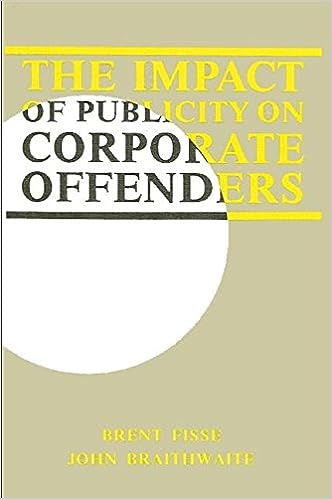Are local newspapers an effective monitor of corporate misconduct?
Harvard Business School’s Jonas Heese and his colleagues looked at the effects of local newspaper closures on violations by local facilities of publicly listed firms.
They found that after a local newspaper closure, local facilities increased violations by 1.1% and penalties by 15.2%.
This effect was not driven by the underlying economic conditions, the underlying local fraud environment, or the underlying firm conditions.
The authors found that local newspapers are an important monitor of firms’ misconduct.
The paper, titled — When the local newspaper leaves town – The effects of local newspaper closures on corporate misconduct was published in August 2022 in the Journal of Financial Economics.
How did you come to address the question of newspapers and corporate crime?
“My overall agenda is to find out how to reduce corporate violations,” Heese told Corporate Crime Reporter in an interview last month. “And I’m using corporate violations here on purpose, because not every violation is a crime. And typically, you have three players – the regulator, the company and the media that reports on it.”
“The regulator often imposes only a small fine. The average worker safety fine is only a couple of thousands of dollars. It’s easy for the corporations to see that as a cost of doing business. And they don’t focus too much on worker safety as a result, especially since they have to focus on too many other things. That being said, what typically can increase the cost of any type of violation is the media coverage.”
“And the interesting thing about local newspapers in particular, in contrast to national newspapers, is that local newspapers are typically much much closer to the problem. And because they are closer to the local community, they are in a better position to report and detect some of these issues. That was the starting point of that paper.”
“On the other side of the argument, local newspapers have limited resources. Quite often, the largest local company might also be the largest advertiser in that newspaper. How independent can they actually be? And how tough can they be in going after these companies?”
“There was a real tension there. Empirically, we tracked and identified local newspaper closures. There have been quite a few over the last couple of decades. Then we used this data set from Violation Tracker. The nice thing about that dataset is that for many of these violations, you can see where they happened. You can see that they happened in a Boeing factory in Seattle, for example.”
“We were able to identify where exactly the violation happened and where a local newspaper closed. And we looked at local violations after a local newspaper closes. The headline finding is that violations were going up after a local newspaper closure. That’s potentially because the reputation costs are much lower.”
The thing corporate executives worry about the most isn’t the fine or the enforcement action, but the adverse publicity. The bottom line for them is the reputation. They are looking carefully at reputation damage to the company.
Thirty years ago, two Australians, John Braithwaite and Brent Fisse wrote a book called The Impact of Adverse Publicity on Corporate Wrongdoing.
But since then there seems to have been a field that has been generally overlooked in academia?
“We all get a little bit cynical about local newspapers. Are they really adding anything of value? Probably not? So do we really need them? Maybe not. But it seems as if they can add a lot of value by highlighting some of these things.”
“Also, the local newspapers might help company leaders identify where they might have problems within their organizations. You yourself as a leader might not be aware of the problems within your own organization.”
You found that the closures of local newspapers lead to a slight increase in misconduct?
“Yes. And we measured it in terms of the number of violations that are going up and the number of penalties – they also went up.”
“Of course, we could only measure detected violations. We could not measure undetected violations.”
“We also used the EPA’s toxics release inventory. That consists of factory reports of toxic emissions. And what we found is that in those areas where newspapers closed, toxic emissions go up by something like 18 percent.”
My experience with local newspapers is that they are not good at reporting corporate wrongdoing.
“That was our initial expectation as well. Local newspapers have limited resources and the local corporations are advertising in the newspaper.”
“But our article captures a large sample of public companies in the United States. And we looked at all types of newspaper closures.”
We reported last week on how corporate crime enforcement is down over the past decade or so, and even down under President Biden compared to President Trump. Could one explanation for the results of your paper be just general lack of enforcement flashing the green light to companies across the board to engage in misconduct?
“One potential interpretation could be that regulators cannot always detect everything, for a number of reasons – constraints on resources, political capture. But in general it’s very difficult to determine who is not behaving the right way. If the regulator has to oversee thousands of companies, it’s not that simple. Precisely because of that, you need other institutions that can help.”
You also wrote a paper titled – Does Industry Employment of Active Regulators Weaken Oversight?
“The backstory for that paper was the Wirecard scandal in Germany. Some people describe it as the Enron of Europe, or at least the Enron or Germany. It was an accounting fraud. As a result of that scandal, academics and politicians took it as an opportunity to look at – what exactly is going on in our capital markets?”
“One question was – why was the German SEC not conducting its own investigations? It was outsourcing it to a self-regulatory organization. And that self-regulatory organization was an industry-run quasi-regulator. It allowed the senior regulator of that body to also serve on company boards at the same time that they were active regulators.”
“Imagine the head of the SEC in the United States being allowed to sit on company boards at the same time.”
It would be as if in the United States, the chief enforcement person at FINRA was allowed to sit on corporate boards.
“Yes. And that is not allowed at FINRA, but what is allowed is that some of the senior board members are active in the industry. It’s a similar kind of conflict of interest at FINRA.”
What did you find in your paper?
“If a company hired the head of the German enforcement agency, there would be no more enforcement actions against that company. At the same time, it appears that these companies became more aggressive in their financial reporting. They were more likely to get pushback from the auditors. They were likely to score higher on proxies for earnings management.”
“It might not be that surprising, but we found that by allowing the head of that oversight body to serve on company boards at the same time as serving as regulator, it compromised the oversight of the company.”
“Eventually the German politicians realized that this was not an effective set-up and that oversight body has since been dissolved. Now the German SEC is doing these oversight activities internally and not outsourcing them to a self-regulatory organization.”
[For the complete q/a format Interview with Jonas Heese, see 37 Corporate Crime Reporter 30(12), July 24, 2023, print edition only.]

